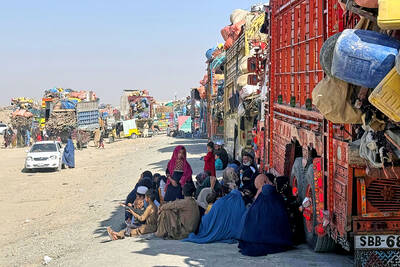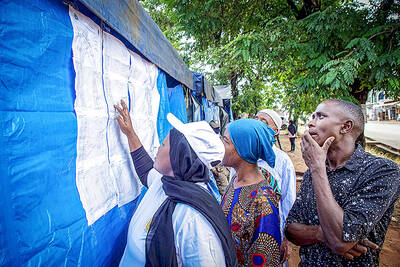Pulled from the mud as an infant after the devastating Indian Ocean tsunami in 2004 and reunited with his parents following an emotional court battle, the boy once known as “Baby 81” is now a 20-year-old dreaming of higher education.
Jayarasa Abilash’s story symbolized that of the families torn apart by one of the worst natural calamities in modern history, but it also offered hope. More than 35,000 people in Sri Lanka were killed, with others missing.
The two-month-old was washed away by the tsunami in eastern Sri Lanka and found some distance from home by rescuers. At the hospital, he was No. 81 on the admissions registry.

Photo: AP
His father, Murugupillai Jayarasa, spent three days searching for his scattered family, with little left to his name in those early hours but a pair of shorts.
First he found his mother, then his wife, but their infant son was missing.
A nurse had taken the baby from the hospital, but returned him after hearing that his family was alive.
However, the ordeal was far from over. Nine other families had submitted their names to the hospital, claiming “Baby 81” as their own, so the hospital administration refused to hand over the child to Jayarasa and his wife without proof.
The family went to the police. The matter went to court. The judge ordered a DNA test, a process that was still in its early stages in Sri Lanka.
However, none of the nine other families claimed the baby legally and no DNA testing was done on them, Jayarasa said.
“The hospital named the child ‘Baby 81’ and listed the names of nine people who claimed the child, omitting us,” he said. “There was a public call to all those who said the child was theirs to subject themselves for DNA testing, but none of them came forward.”
Jayarasa said his family gave DNA samples and it was proven the child was theirs.
Soon, the family was reunited.
Today, Abilash is sitting for his final high-school exam. Solid and good-natured, he hopes to attend a university to study information technology.
He said he grew up hearing about his story from his parents, while classmates teased him by calling him “Baby 81” or “tsunami baby.” He was embarrassed, and it worsened every time the anniversary of the tsunami arrived.
“I used to think: ‘Here they have come’ and run inside and hide myself,” he told reporters.
His father said the boy was so upset he would not eat at times.
“I consoled him saying: ‘Son, you are unique in being the only one to have such a name in this world,’” he said.
Later, as a teenager, Abilash read more about the events that tore him from his family and brought him back, and he lost his fear.
He knows that the nickname will follow him, but that is all right.
“Now I only take it as my code word,” he said, joking: “If you want to find me out, access that code word.”

With much pomp and circumstance, Cairo is today to inaugurate the long-awaited Grand Egyptian Museum (GEM), widely presented as the crowning jewel on authorities’ efforts to overhaul the country’s vital tourism industry. With a panoramic view of the Giza pyramids plateau, the museum houses thousands of artifacts spanning more than 5,000 years of Egyptian antiquity at a whopping cost of more than US$1 billion. More than two decades in the making, the ultra-modern museum anticipates 5 million visitors annually, with never-before-seen relics on display. In the run-up to the grand opening, Egyptian media and official statements have hailed the “historic moment,” describing the

‘CHILD PORNOGRAPHY’: The doll on Shein’s Web site measure about 80cm in height, and it was holding a teddy bear in a photo published by a daily newspaper France’s anti-fraud unit on Saturday said it had reported Asian e-commerce giant Shein (希音) for selling what it described as “sex dolls with a childlike appearance.” The French Directorate General for Competition, Consumer Affairs and Fraud Control (DGCCRF) said in a statement that the “description and categorization” of the items on Shein’s Web site “make it difficult to doubt the child pornography nature of the content.” Shortly after the statement, Shein announced that the dolls in question had been withdrawn from its platform and that it had launched an internal inquiry. On its Web site, Le Parisien daily published a

‘NO WORKABLE SOLUTION’: An official said Pakistan engaged in the spirit of peace, but Kabul continued its ‘unabated support to terrorists opposed to Pakistan’ Pakistan yesterday said that negotiations for a lasting truce with Afghanistan had “failed to bring about a workable solution,” warning that it would take steps to protect its people. Pakistan and Afghanistan have been holding negotiations in Istanbul, Turkey, aimed at securing peace after the South Asian neighbors’ deadliest border clashes in years. The violence, which killed more than 70 people and wounded hundreds, erupted following explosions in Kabul on Oct. 9 that the Taliban authorities blamed on Pakistan. “Regrettably, the Afghan side gave no assurances, kept deviating from the core issue and resorted to blame game, deflection and ruses,” Pakistani Minister of

UNCERTAIN TOLLS: Images on social media showed small protests that escalated, with reports of police shooting live rounds as polling stations were targeted Tanzania yesterday was on lockdown with a communications blackout, a day after elections turned into violent chaos with unconfirmed reports of many dead. Tanzanian President Samia Suluhu Hassan had sought to solidify her position and silence criticism within her party in the virtually uncontested polls, with the main challengers either jailed or disqualified. In the run-up, rights groups condemned a “wave of terror” in the east African nation, which has seen a string of high-profile abductions that ramped up in the final days. A heavy security presence on Wednesday failed to deter hundreds protesting in economic hub Dar es Salaam and elsewhere, some